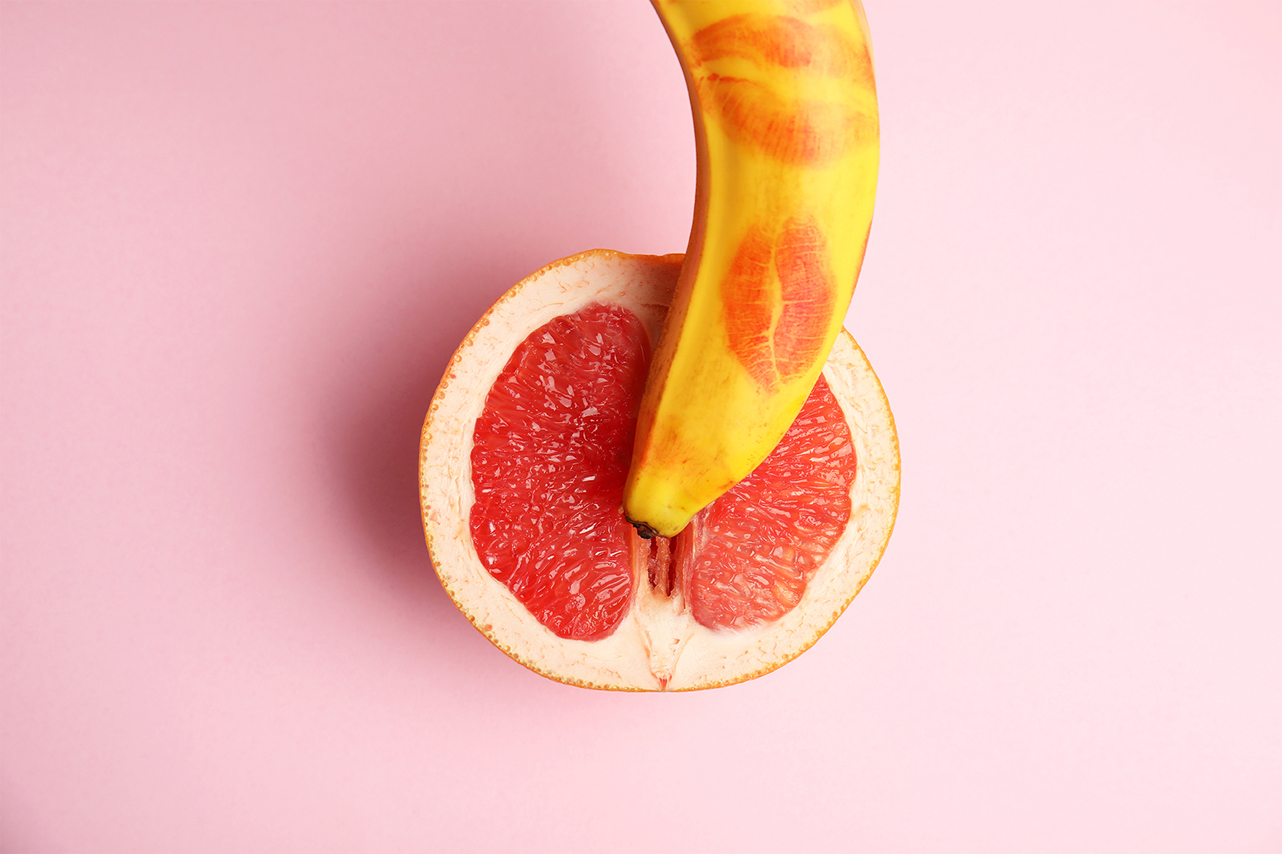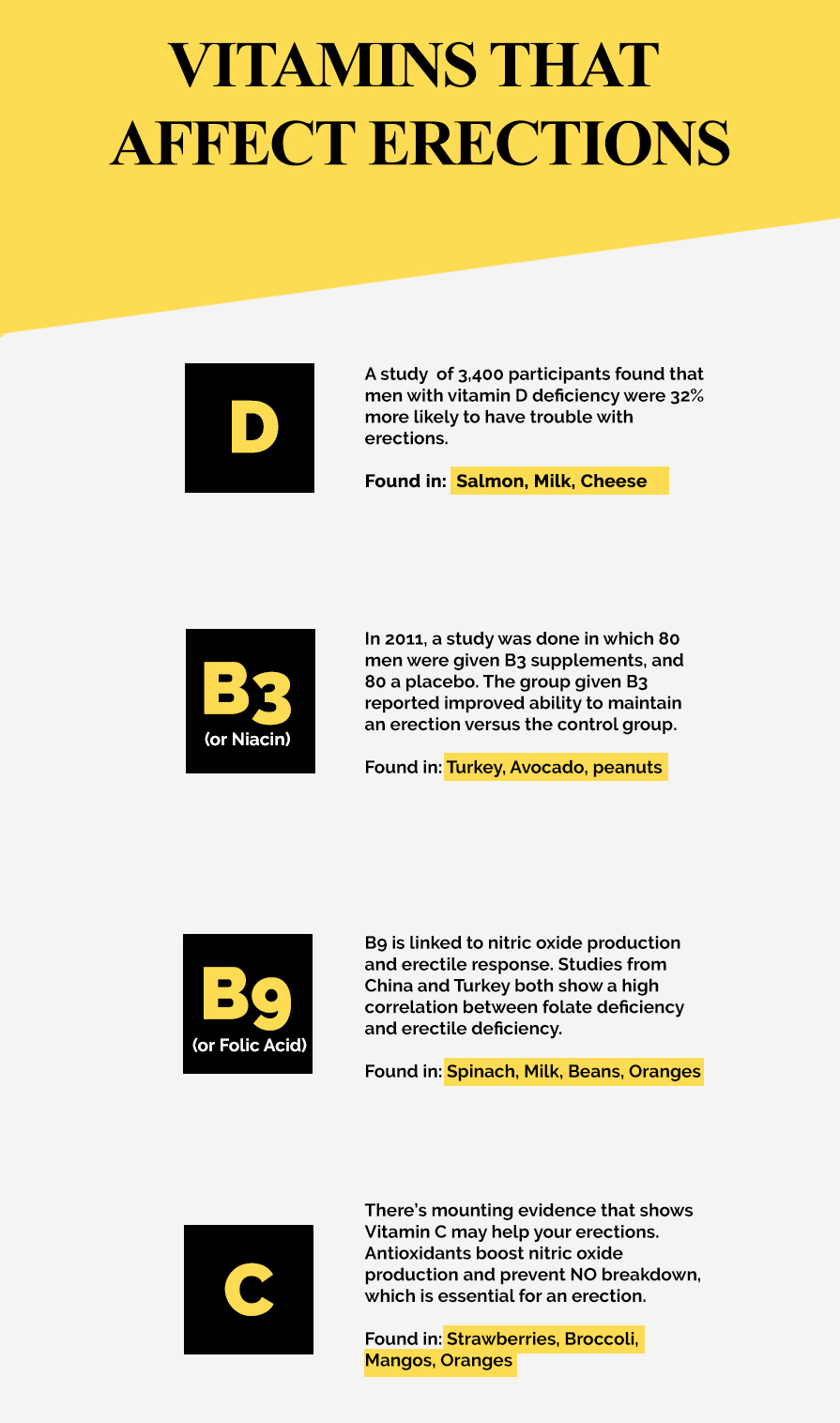ERECTIONS AND VITAMIN D
Much of the evidence shows high rates of vitamin D deficiency in patients with erectile dysfunction. In fact, one study of 3,400 participants found that men with vitamin D deficiency were 32% more likely to have trouble with erections when all other risk factors were controlled for. It’s a little on the nose that you need vitamin D for your “D,” but hey—science can be funny too.
Men with vitamin D deficiency were 32% more likely to have “trouble with erections”
Risk factors for vitamin D deficiency include obesity and high BMI, not enough sun exposure or outdoor activity, having darker skin and suffering from certain from inflammatory conditions like Crohn’s disease. You can get a blood test to find out if you’re vitamin D deficient.
The Institute of Medicine recommends cumulative daily vitamin D intake of 600 international units (IU) for adults between 18 and 70 years of age , and 800 IU for those over 80. A 3oz serving of salmon contains about 450IU, while an 8oz. glass of milk only has about 100IU. Low vitamin D levels may be an independent, potentially modifiable risk for ED, so it’s worth taking Vitamin D supplements for your “D.” However, keep your daily vitamin D supplement intake below 4,000IU, as too much vitamin D can be toxic.
L-ARGININE: THE CHEMICAL BEHIND ERECTIONS
Erection are a surprisingly complex process with a lot of moving parts and chemical reactions. However, there’s one important chemical—nitric oxide (NO)—that you absolutely need to get and maintain an erection. And you need L-arginine to make it.
NO is responsible for relaxing the smooth muscle lining of blood vessels in your penis to encourage increased blood flow to the penis. Thanks to this process, your penis can contain up to 6x the normal amount of blood flow and you achieve an erection. If your don’t produce enough nitric oxide, your erections will be soft, limp or even nonexistent.
An erect penis contains up to 6x the normal amount of blood flow
Nitric oxide is made internally from L-arginine, which is an amino acid found in red meat, poultry, fish, and dairy products. In other words, L-arginine is the building block for nitric oxide, which is essential for erections. A lack of one can lead to a lack of the other. However, there’s a problem when it comes to treating L-arginine deficiency with supplements.
Studies have shown that when you take L-arginine in oral form, your body breaks it down too quickly. It’s best to use L-citrulline to replace L-arginine because L-citrulline gets converted to L-arginine more slowly.
Bottomline: L-citrulline supplements are a better way to replace L-arginine than direct supplements.
VITAMIN B3 IS FOR BONERS
Vitamin B3 (or niacin if you prefer) is a commonly used supplement and medication for vascular conditions. You might even recognize it from the recommended daily allowances on your box of Captain Crunch. What you probably didn’t read on the cereal box is that niacin supplements may also help your erection.
A 2011 study of 160 men with moderate or severe erectile dysfunction divided the group in two—80 men were given niacin supplements, and 80 a placebo. The group given niacin reported improved ability to “maintain an erection versus the control group.” It’s not exhaustive research, but still promising. The best part about niacin is that it’s naturally found in foods like turkey, avocado, and peanuts (yum). If you’re not a turkey sandwich fan, you can supplement with a vitamin B complex.
FOLIC ACID AND ERECTILE DYSFUNCTION
Folic acid (vitamin B9) is also linked to nitric oxide production and the erectile response. Studies from China and Turkey both show a high correlation between folate deficiency and erectile deficiency.
Taking a B complex supplement could raise your B9 levels, or you can eat more spinach and drink milk and orange juice. If you want to find out if you’re low on folic acid, you have to take a blood test. Just ask your doc at your next checkup.
VITAMIN C

We all know that Vitamin C (ascorbic acid) is great for keeping you healthy and fighting off scurvy, but there’s some mounting evidence that shows it may help your erection too.
Antioxidants boost nitric oxide production and prevent NO breakdown. Ascorbic acid has direct effects on the bioactivity of NO, and augments NO production in a variety of body processes. The effects are actually synergistic with Vitamin E. Both vitamins are not usually measured, and a reasonable dose of Vitamin C is 500 to 1,000 mg daily. Vitamin E supplementation should be limited to <400 IU per day because of potential adverse long-term health effects of higher doses.
VITAMIN SUPPLEMENTS AND ERECTILE DYSFUNCTION
Vitamins are big business for a reason. Your body uses a series of complex vitamins, minerals, and amino acids for everything from neural connectivity to erections. While it’s important to take a holistic approach to health, remember that certain vitamin deficiencies can impact your health in ways you never imagined.



